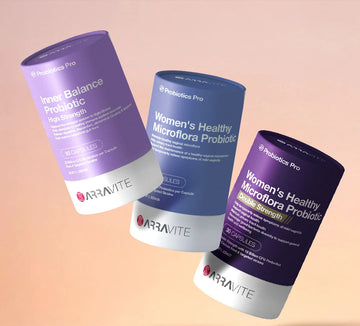You cross your legs and wiggle on your seat hoping that your colleagues don't notice you're a tad bit itchy…down there. Sound familiar?
Not only is an itchy vagina or vulva hella annoying, but it could also be a sign there’s something a bit more serious going on. If you’re concerned, it’s always a good idea to consult your doctor. You might find it a little embarrassing to talk to someone about your vaginal health, but remember, there’s no shame in the self-love game and looking after your vagina is all part of being happy and healthy. Besides, your doctor has seen it all before, so there’s no need to be shy about it.
What other symptoms do you have?
An itchy vagina often comes with friends - their “friends” being some very annoying accompanying symptoms. Depending on what’s causing the vaginal itchiness, you might also experience:
- Burning
- Pain during urination
- Discharge
- Bumps
- Dryness
- Red inflammation
- Painful sex
- Swelling
- A strong odour
Causes of vaginal itchiness
There are about as many causes of vaginal itchiness as there are types of vaginas (trust us, every labia is different and wonderful). Many of the causes are interconnected, and it’s possible to experience several at a time. Lucky for you, most of them are not serious and with a little TLC, can be prevented.
1. Yeast infection
One of the most common reasons behind your itchy vagina is a vaginal yeast infection, otherwise known as vaginal candidiasis.
Yeast is a naturally occurring fungus that lives within the vagina, and when your system is a bit all over the place, it can cause an overgrowth of lactobacillus bacteria, which can lead to symptoms such as a red, inflamed and itchy vagina.
Yeast infections are super-common. Three in four people will experience one during their life, and an infection can be caused by heaps of things, like pregnancy, stress, a weakened immune system, antibiotics, or a hormonal imbalance.
The good news is, while it's pretty hard to escape a yeast infection at least once in your life, it’s a normal thing to experience and they usually don’t last too long.
2. Bacterial vaginosis
Often mistaken for a yeast infection, bacterial vaginosis (BV) is another vaginal infection caused by bacterial overgrowth. Think of BV as yeast infection’s in-identical twin. Similar and easily confused, but not quite the same.
BV is generally associated with an itchy vagina and smelly discharge, which can be white, grey, or greenish and have a ‘fishy’ scent. It usually occurs in those who are sexually active but it’s not transmissible between sexual partners.
It’s possible to have both BV and a yeast infection at the same time, but either way, it’s best to get checked so our medical friends can provide you with the right treatment.
3. Irritants / allergic reaction
Okay, we all love a scented moisturiser or luxe bubble bath, but when it comes to vaginal health, it’s best to steer clear of fragrances and other irritants.
Many products you might be using in your everyday life could be behind your itchy vagina or vulva. If in contact with your vaginal area, they can trigger a reaction and lead to an imbalance of the good and bad bacteria.
Sadly, that means you might have to cull your favourite rose-scented pink glitter bath gel, as it might not be so rosy after all.
Some of the common nasties giving you the itch can be found in:
- Soap
- Creams
- Detergents and fabric softeners
- Baths (with bath bombs or similar products)
- Menstrual pads
- Certain materials
- Latex condoms
The main enemy here? Fake fragrances - and nobody likes a fake. Instead, use products that are unscented and fragrance-free.
4. Sexually-transmitted infection
Sexually transmitted infections (STIs) are a group of infections that you can potentially contract after unprotected sex with someone who has one.
Chlamydia, genital warts, genital herpes, gonorrhoea and trichomoniasis are all different types of STIs and don’t always have obvious symptoms, but they could be the reason behind your itchy vagina.
If you’re sexually active, it’s best to get tested regularly. We know STIs can be a bit of a taboo topic, but they’re a lot more common than you think, so don’t be afraid to talk about it!
Getting checked regularly is important, as some STIs can cause long-term health conditions, such as infertility or pelvic inflammatory disease.
5. Skin conditions
Another possible cause of your vaginal itchiness is an underlying skin condition. Types of dermatitis, psoriasis, and eczema can all contribute to itchiness.
Dermatitis is a general skin irritation that usually causes itching, dryness, or a rash. Certain chemicals can trigger dermatitis, so it is best to use products or materials that are gentle on your skin (that don’t include our enemy…fake fragrances).
Psoriasis is a condition in which skin cells are produced too quickly, causing red, thick, and scaly patches of skin, again causing itchiness.
Eczema is an inflammatory skin disease that causes redness and skin tears, which over time can lead to lichen simplex chronicus on the vagina, causing intense itchy inflammation.
Two other potential skin conditions are lichen sclerosus and lichen planus, however, they’re less common. Both are non-contagious autoimmune diseases that occur when your immune system (basically betrays you) and attacks the skin, leading to itchiness.
6. Menopause / low oestrogen levels
Due to changing hormone levels, menopause can lead to a dry itchy vagina. A reduction in oestrogen levels has been linked to dryness of the vagina, which with time can lead to itchiness and irritation.
It’s normal for oestrogen levels to drop with age. Thyroid issues, excessive exercise or genetics can also lead to a decline in oestrogen.
7. Vulva cancer
A more serious underlying cause of your itchy vagina could be vulva cancer. This is a type of cancer that forms on the vulva, which includes the inner and outer vaginal lips, the clitoris and the opening.
Sometimes there are no symptoms, but some common signs to look out for are itchiness, pain, bumps, ulcers or bleeding that isn’t from menstruation.
8. Stress
Stress isn’t so much a direct cause of an itchy vagina, but physical and emotional stress can lead to a weakened immune system. This makes it a lot easier to form other infections, which can cause vaginal itching.
Managing stress is important for your general health, so be sure to prioritise your wellbeing to live a happier life and prevent long-term health conditions.
9. Pregnancy
An itchy vagina during or after pregnancy is a normal occurrence for many people. With so many changes happening to your body, there are a few factors that can indirectly lead to itchiness.
Changes to your body’s natural bacteria and hormones can make you more prone to things like bacterial vaginosis, yeast infections, dryness, and UTIs and make you more sensitive to irritants.
10. Your period
Like pregnancy, your period can bring on hormonal changes, as well as changes to pH levels within your vagina.
Okay - science lesson for you. Ranging from 0 to 14, your vagina’s pH levels refer to how acidic or alkaline your vagina is. Anything below 7 is considered acidic, and anything above 7 is alkaline. A healthy vagina sits around the 3.8 to 4.5 mark, so it’s on the acidic side.
When blood, which has a high alkaline level, is present during your period, it raises the natural vaginal pH levels, creating an environment where bad bacteria and fungus can thrive more easily. The imbalance can make you more prone to a yeast infection or bacterial vaginosis, meaning you’re more likely to experience vaginal itchiness during your period. It’s also common to feel itchiness before your period and after, as hormones can be a bit out-of-whack.
11. Sex
If you’ve ever experienced an itchy vagina after sex, you can likely blame a lack of lubrication, particularly if you already experience vaginal dryness. Without enough lubrication, the vaginal wall isn’t protected and friction from sex can lead to irritation, as dry skin can easily tear or flake. Add more lube to your life - you won’t regret it.
If you’re using condoms, it could also be due to an allergy to latex. You may experience a mild to severe reaction after using a latex condom, depending on your sensitivity and contact level. If you experience trouble breathing, nausea, vomiting, swelling or dizziness, you should seek emergency care as you might be having an anaphylactic shock.
If you’re are experiencing vaginal itchiness after sex, it’s also possible you could have contracted a sexually transmitted infection. As mentioned above, it’s easier for an STI to be transmitted with unprotected sex, so it’s important to use protection.
Lastly, semen may have something to answer for. Semen has high alkaline levels, which can lead to a pH imbalance in your vagina. This can create an environment where bad bacteria and yeast can thrive, leading to infection.
12. Diabetes
Diabetes is a condition that occurs when your body doesn’t know how to make or use insulin, which helps regulate blood sugar. This causes spikes in blood sugar levels if not properly managed.
High levels of blood sugar then appear in the mucus of the vagina, which serves as the perfect environment for yeast to thrive, increasing your chances of getting a yeast infection.
Altering lifestyle habits to keep your blood sugar in check can help you maintain your vaginal health and reduce the effects of diabetes.
13. Shaving
Have you experienced an itchy vulva after shaving? There are two main causes: razor burn and folliculitis.
Razor burn can come from using an incorrect shaving technique, using a broken razor or shaving sensitive skin.
Folliculitis, on the other hand, is a type of skin condition caused by infected hair follicles under the skin.
Both razor burn and folliculitis can lead to red itchy bumps on the vagina. You can avoid this by using a sharp, clean razor and shaving in the direction of the hairs. Try shaving sparingly, and use a shaving cream or gel that doesn’t contain harsh chemicals.
So you have an itchy vagina…what next?
When to see a doctor
If your symptoms continue for more than a week, or are simply driving you crazy, seek medical advice.
Usually, vaginal itching clears up on its own, but if it keeps coming back, or you think it may be due to an underlying issue, you should speak to a healthcare professional so they can help you find the best treatment.
What to expect
During your appointment, your doctor will likely ask questions about your symptoms, including their duration, regularity and intensity.
They may examine your vaginal area, which could include a swab test to identify any possible STI or vaginal infections.
Remember, your doctor is a trained medical professional - they won’t shame you for your symptoms and they definitely won’t be surprised. They can’t examine you without your consent, so if you don’t feel comfortable with a physical examination, check with your doctor for alternative solutions.
Medical treatment for an underlying condition
For the most part, there are plenty of natural ways to avoid vaginal itchiness, but if it’s being caused by an underlying medical condition, it’s likely your doctor will prescribe a course of treatment.
Treating a yeast infection
A yeast infection can usually be treated within a week using an antifungal medication. They’re commonly available as tablets, ointment or cream.
Treating bacterial vaginosis
Doctors often prescribe antibiotics to treat bacterial vaginosis, which is available as a tablet or as a cream that you insert into your vagina.
Treatment for sexually transmitted infections
Depending on which sexually transmitted infection you have, you’ll generally be prescribed a type of antibiotic or antiviral medication.
The length of treatment depends, but you must avoid having sex until you’ve been given the all-clear. If you’ve tested positive, you need to notify any sexual partner you have had since your last test, so they know to get tested too.
How to prevent an itchy vagina
To prevent getting an itchy vagina in the future or to ease the symptoms in general, there are some lifestyle changes you can make.
It’s important to take care of your general health and wellbeing to maintain a strong immune system and fight off infections. Look after your vagina with a few of these tips:
- Convert to using natural products, especially if there's any risk of it being in contact with your vagina or vulva. Avoid using things with harsh chemicals such as perfumes, fragrances, alcohol and parabens, as they may cause irritation or an imbalance in your pH levels.
- Change your pad/tampon regularly to avoid a build-up of bad bacteria and a potential yeast infection.
- Never douche! This method of ‘cleaning’ is very harmful to the vagina, and has been linked to serious long-term health complications.
- Take probiotics, as they help to balance bacteria within your body and support the maintenance of a healthy vaginal microbiome.
- Always wipe from front to back after using the toilet.
- Change your underwear regularly, and avoid synthetic materials as these foster bad bacteria growth.
- Use condoms to protect yourself from STIs.
- Avoid using antibiotics unless you really need to, or make sure you take a course of high-strength probiotics alongside your antibiotics to maintain your body’s natural microflora.
- Avoid scratching or rubbing the irritated area, as this can make it worse.
- Use a water-based lube when having sex, especially if you’re prone to vaginal dryness.
- Change out of exercise clothes, bathers, or anything damp as soon as possible, to avoid the growth of bad bacteria.
Improve your vaginal health and stop the itch
Vaginal health may feel like a taboo topic, but Arravite is proactively fighting the stigma to make women’s health a part of everyday conversation.
Most people with vaginas or vulvas will experience itchiness at some point in time. It’s very common, and there are a million different reasons for it. But that doesn’t mean you can’t take preventative actions, such as simple lifestyle changes, to keep your vagina healthy and itch-free (without the need to be on regular medication or consistent cycles of antibiotics!).
If you’re curious about taking probiotics to support your vaginal health, check out ARRAVITE's Probiotics Pro.
Disclaimer
Always read the label. Follow the directions for use. If symptoms persist, talk to your health professional. Supplements may only be of assistance if dietary intake is inadequate. Do not use if cap seal is broken.







